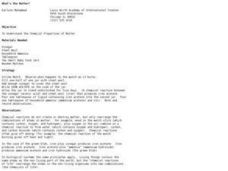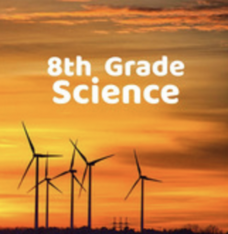Curated OER
Make Me Metric
Students discover the need for standard units of measurement. They be engaged in estimation, problem solving, and use of measurement tools to begin an understanding of the metric system.
Curated OER
Move Your Muscles!
Students, through teacher lecture and class discussion, explore the three different types of muscles in the human body and the effects of microgravity on these muscles. They explain what happens to muscles in outer space and describe the...
Curated OER
Investigating the Moon
Third graders explain why we study the moon. In this moon instructional activity, 3rd graders brainstorm and create a thinking web focused on what they know about the moon. Students complete a provided worksheet to organized their ideas...
Curated OER
Layers of Time in the Earth
Students are introduced to the concept of stratification as a historical and geological process. Students will read about the Richard Beene archaeological site, which lies near San Antonio, Texas on the Medina River, and watch a short...
Curated OER
Language Arts: The Earth Is My Mother
Students sing the melody to a Native American song in both English and Oneida languages. They discuss how the words reflect the beliefs of their culture. Students copy the words to the song, The Earth Is My Mother in both languages.
Curated OER
Where in the World? The Basics of Latitude and Longitude
Learners are introduced to the concepts of latitude and longitude. In groups, they identify the Earth's magnetic field and the disadvantages of using compasses for navigation. They identify the major lines of latitude and longitude on a...
Curated OER
Is There Water on Mars?
Students decide whether or not there is or has even been water on Mars. They analyze temperature and pressure data from the Pathfinder mission to Mars, and then they analyze images of Mars, interpreting the landforms they see and...
Curated OER
Water Filtration Challenge
Students create an all-natural water filtration system. In this lesson on natural water filtration, students build upon prior knowledge to build a filtration unit made of plants, soils, sand, pebbles and rocks that can purify...
Curated OER
Naming the Clouds
Fourth graders examine how water condenses into clouds and identify the different types of clouds using the same system devised over 200 years ago. They listen to a book about clouds, and create a Cloud Key. Next, they record their...
Space Awareness
Oceans as a Heat Reservoir
Oceans absorb half of the carbon dioxide and 80 percent of the greenhouse gases released into the atmosphere. Scholars learn how and why the oceans store heat more effectively than land and how they help mitigate global warming. Pupils...
Laboratory for Atmospheric and Space Physics
Space Travel Guide
Looking to take a trip? Why not go to space? Here, scholars take on the role as travel agent to create a guide to their favorite planet including travel tips and sightseeing recommendations.
Curated OER
T3 Lesson Plan: Number 3
Sixth graders investigate local water. In this water cycle lesson, 6th graders take samples from surrounding water sources. Students record data from the samples, compare and graph the results.
Curated OER
Geography 12
Geography is such a fascinating subject for learners of all ages. Prepare learners with good guiding questions, which they can use while reading their texts. Each of the provided 13 questions requires a full paragraph response on the...
Curated OER
Sunny Symbols
After listening to a series of stories about signs and symbols associated with the United States, pupils discuss the importance of the sun in Native American legends and as a representation of New Mexico. As part of this exploration,...
NASA
Determining the Nature, Size, and Age of the Universe
Prompt scholars to discover the expansion of the universe themselves. Using photographs of other galaxies, they measure and then graph the size and distance of each. Finally, they draw conclusions and prove the universe is expanding.
Curated OER
What's the Matter? (Living and Non-Living Things)
Understand how chemical reactions recombine atoms to create the "chemicals of life". An experiment, showing the basic chemical reactions of an iron nail or a match, helps young children start their understanding of permanent changes.
Curated OER
Earthquake Detector
Learners investigate earthquakes and describe the interactions inside the Earth that cause them to occur. Then they research the equipment and systems for detection and measurement of earthquakes. Students also build and engage in a...
Institute of Electrical and Electronics Engineers
Solar Structures
It's time to soak up the sun! Youngsters read about active and passive solar heating systems, then they collaborate to create a miniature solar-heated building. Provide a variety of materials for them to incorporate and watch their...
BW Walch
Kelper's Second Law: How Do Planets Move?
Kepler's second law of planetary motion, specifically, the law of equal areas, is demonstrated by your high schoolers. On the provided graph paper, they mark out the designated path of Earth at two different times of the year and then...
NASA
Introduction to Astronomy
Welcome to your new job as an astrophysicist, astrobiologist, engineer, or research scientist at NASA. Your job is to search for alien life in our solar system! Throughout a unit of activities, learners search the galaxy through...
NOAA
Ocean Currents
Go with the flow! The eighth installment in a 13-part series has earth science students dive in to the world's system of ocean currents. The interactive illustrates the different types and depths of currents, how wind and gravity...
Colorado State University
Can it Really Rain Fish and Frogs?
You've heard of it raining cats and dogs ... but what about fish and frogs? It turns out, one scenario is much more likely than the other! Intrepid weather investigators examine the curious behavior of waterspouts using a leaf blower,...
Utah Education Network (UEN)
Utah Open Textbook: 8th Grade Science
The cycle of energy is important to many different systems on Earth. Scholars use questioning and observation to investigate the differences between renewable and non-renewable resources and how they relate to global changes. They...
California Academy of Science
Modeling Eclipses with Size and Distance Scales
Size within the solar system is a difficult thing for pupils to imagine. Using everyday objects, they build models to show the scale between the sun, moon, and Earth. They situate their props in proportional distances between the objects...
Other popular searches
- Earth System Origins
- 4 Major Earth Systems
- Moon Earth System
- Earth Systems Unit
- Major Earth Systems
- Earth Systems Interactions
- Sun Earth Moon System
- Earth Systems Global Winds
- Earth Systems 3209
- Earth Systems Science
- Earth Systems and Patterns
- Earth System Atmosphere

























